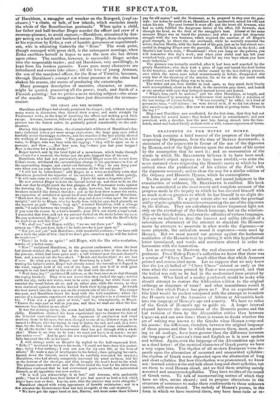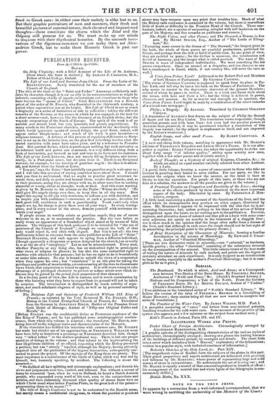DRANDRETII ON THE METRE OF HOMER.
Tins book contains a brief resume of the progress of the inquiry respecting the Digamma, from the time of BENTLY downwards ; a statement of the arguments in favour of the use of the 'digamma by Hommt, and of the light thrown upon the structure of his metre by the assumption that he used it ; and an enumeration of the words in which Mr. BRANDRETH believes it to have been used. The author's object appears to have been twofold,—to stdte the more matured views respecting the Homeric metre at which he has arrived since the publication of Isis edition of the Iliad with the digamma restored ; and to clear the way for a similar edition of the Odyssey and Homeric Hymns, which he contemplates. To the praise of candour, industry, and sound judgment in the examination of evidence, Mr. BRANDRETII is entitled. His book may be considered as the most recent and complete account of the progress made in the inquiry to which he has devoted himself with so much zeal—a progress to which be has himself in no slight de- gree contributed. To a great extent also we admit the practisal utility of palmographic researches concerning the use of the digamma by the Eolians. They are calculated to throw important light not only on the etymology of the Greek language, but on the relation- ship of the Greek tribes, and even the affinities of various languages. Nor are we inclined to deny the interest and utility (though of a subordinate character) of the attempt to elucidate the Homeric metre by attempts to ascertain in what words the digamma—or more properly, the articulate sound it expresses—were used by HOMER. But we must record our protest against the barbarous mutilation of the Homeric text by printing it with this hypothetical letter introduced, and words and sentences altered in order to harmonize with the innovation.
Let us attempt to illustrate the real character of such an ex- periment. From Bishop PERCY'S collection we know that there was a version of "Chevy Chase" much older than that which ADDISON printed and commented upon. Let us suppose that we only knew that the (or a) ballad of "Chevy Chase" existed as early as the time when the version printed by PERCY was composed, and that the ballad was only to be had in the modernized form printed by Annisos. What kind of a motley patchwork would be make who should attempt to restore the Addisonian edition to the original orthoepy or structure of verse? and what resemblance would it bear to that which PERCY has given us ? But an experiment of this kind would be modest compared with the attempt to translate the Homeric text of the ADDISONS of Athens or Alexandria back into the language of HOMER'S age and country. We have no relies of the Greek of HomEn's age to guide us. A longer interval elapsed between the composition of the Homeric poems and the last revision of them by the Alexandrian critics than between CHAUCER and our own time : there is reason to doubt whether the art of writing was known to the Greeks when Mama composed his poems : the difference, therefore, between the original language of those poems and that in which we possess them, must, accord- ing to all analogy, have been greater than the difference between the language of CHAUCER'S time and English as it is now spoken and written. Again, even the language of the Alexandrian age is to us a dead letter : of the metrical character of Greek poetry we have a very vague idea. The rhythm of all modern European verse de- pends upon the alternation of accented and unaccented syllables : the rhythm of Greek verse depended upon the alternation of long and short syllables. But how this rhythm was pronounced, we know not : learned critics write and talk about long and short syllables, but set them to read Horesa aloud, and we find them uttering merely accented and unaccented syllables. They have no idea of the sound of Greek verse. To talk of reconstructing metres of which they have no idea, seems absurd ; and to propose alterations in the structure of sentences to make them conformable to those unknown metres, still more absurd. The melody of HOMER'S poems, in the form in which we have received them, may have been rude or re- fined to Greek ears: in either case their melody is alike lost to us. But their graphic portraiture of men and manners, their fresh and beautiful pictures of external nature, their elevated and impassioned thoughts—these constitute the charm which the Iliad and the Odyssey still possess for us. We must mile up our minds to dispense with their rhythmical beauties. By the uncouth inno- vations of the digamnm-restorers we can make them not Alex- andrian Greek, but to make them llotneric Greek is past our power.



























 Previous page
Previous page